Kaist
Korean

Alumni News
-

Next Generation Robots Roaming Shipyards and City ..
< Diden Robotics Research Team Co., Ltd (Leftmost person in the front row is CEO Joon-Ha Kim)> KAIST announced on the September 30th that domestic robot startups, founded on KAIST research achievements, are driving new innovation at shipyards and urban worksites. An industrial walking robot that freely climbs walls and ceilings and a humanoid walking robot that walks through downtown Gangnam are attracting attention as they enter the stage of commercialization. The stars are DIDEN Robotics Co., Ltd. and Eurobotics Co., Ltd. Diden Robotics is providing a new breakthrough in the industrial automation market, including the shipbuilding industry, by commercializing its innovative 'Seungwol (Ascend and Cross) Robot' technology, which allows it to move freely and work on steel walls and ceilings. Eurobotics is commercializing world-class humanoid walking technology, and this achievement is scheduled to be officially presented at the international humanoid robot conference, 'Humanoids 2025,' to be held on October 1st. < Diden Robot's Outer Plate (Longi) and Welding Test > Diden Robotics is a robotics startup jointly founded in March 2024 by four alumni from the KAIST Mechanical Engineering Hu-bo Lab DRCD research team (Professor Hae-Won Park). Its flagship product, 'DIDEN 30,' is a quadrupedal robot designed for use in high-risk work environments that are difficult for humans to access, combining autonomous driving technology, a foot-shaped leg structure, and magnetic feet. The 'DIDEN 30' successfully completed the 'Longitudinal (longi) Overcoming Test,' in which it stepped over steel stiffeners (longitudinals) densely installed as part of the structure at a ship construction site, proving its potential for field deployment. Currently, the company is conducting research to enhance its functionality so it can stably pass through access holes, the narrow entryways inside ships. It is also pushing for performance improvements so it can be deployed for real tasks such as welding, inspection, and painting starting in the second half of 2026. A next-generation bipedal walking robot, 'DIDEN Walker,' is also under development. Targeting the completion of a prototype in the fourth quarter of 2025, it is being designed for stable walking in cramped and complex industrial environments. Plans are also underway to equip it with an upper-body manipulator for automated welding in the shipbuilding industry. Diden Robotics is accelerating the advancement of its proprietary 'Physical AI' technology. The core is the self-developed AI learning platform, 'DIDEN World,' which applies an offline reinforcement learning method where the AI generates optimal motion data in a virtual simulation beforehand and learns without trial and error, increasing learning efficiency and stability. < Diden Robot (DIDEN 30) > Furthermore, to actually implement the AI technology, the company is internalizing its hardware and advancing its 3D recognition technology, which serves as the robot's 'eyes.' It is aiming for a completely autonomous walking system that requires no worker intervention by 2026, using technology such as 3D mapping based on four cameras. In addition to this technological development, Diden Robotics successfully performed the longitudinal overcoming, Seungwol test, and welding work on blocks under construction through a joint development with Samsung Heavy Industries in September. This is a significant achievement, meaning Diden Robotics' technology has been validated in actual industrial settings, moving beyond the laboratory level. Meanwhile, Diden Robotics is collaborating with major domestic shipyards, including Samsung Heavy Industries, HD Hyundai Samho, Hanwha Ocean, and HD Korea Shipbuilding & Offshore Engineering, to develop site-customized robots. Joon-Ha Kim, CEO of Diden Robotics, stated, "The successful tests at the Samsung Heavy Industries site proved the practicality and stability of our technology. We will establish ourselves as a leading company in solving labor shortages and driving automation in the shipbuilding industry." < (Eurobotics Research Team Co., Ltd.)(Leftmost person in the top row is CEO Byung-ho Yoo) > Eurobotics is an autonomous walking startup jointly founded by three alumni from Professor Hyun Myung's research team at KAIST. It is promoting the commercialization of autonomous walking technology for indoor and outdoor industrial sites, including rough terrain. In a recently released video, a humanoid equipped with control technology developed by Eurobotics attracted attention by walking naturally through the crowd in downtown Gangnam. The core technology is the 'Blind Walking Controller.' It determines locomotion based only on internal information without external sensors like cameras or LiDAR, enabling stable walking regardless of day, night, or weather. The robot performs locomotion by 'imagining' the terrain without precise terrain modeling, demonstrating robust performance with the same controller across various environments such as sidewalks, downhill slopes, and stairs. This technology originated from the quadrupedal walking competition at the 2023 International Conference on Robotics and Automation (ICRA), where Professor Myung's lab participated, and proved its world-class capability by winning, beating MIT by a large margin. At the time, Byungg-ho Yoo, CEO of Eurobotics, led the team, and Co-CTOs Min-ho Oh and Dong-kyu Lee directly participated in developing the core autonomous walking technology. Based on this, they continued further development tailored to the humanoid environment and have entered the commercialization stage. < Eurobotics' Humanoid Walking > Byung-ho Yoo, CEO of Eurobotics, emphasized, "This video is the first step toward complete humanoid autonomous walking. We will develop KAIST's research achievements into technologies that can be immediately utilized in industrial settings." Hyeonmin Bae, Head of the KAIST Startup Center, said, "We will provide close support from the initial stages to help the on-campus robotics industry grow actively and assist them in settling down stably." Kwang Hyung Lee, President of KAIST, stated, "This achievement is a representative case showing that KAIST's fundamental technologies are rapidly spreading to industrial fields through startups. KAIST will continue to actively support innovative entrepreneurship based on challenging research and help lead the global robotics industry." ※ https://2025humanoids.org https://www.seoulairobot.com/
-

Mobility 2025 Technology Demonstration Day Held.....
< Kitae Jang, Director of Mobility Research Institute, Hyeong-sik Jeon, Vice Governor for Political Affairs of South Chungcheong Province and demonstration officials > KAIST's e announced on the September 23rd that it held the "2025 Technology Demonstration Day" at the Naepo Knowledge Industry Center in Chungcheongnam-do to showcase successful cases of its research findings being adopted by the industry. The event was organized to present the process of commercializing KAIST's accumulated mobility research achievements through collaboration with companies. The KAIST Mobility Research Institute aims to solve our society's mobility problems by conducting industry-academia research in various technology fields, including autonomous driving, Urban Air Mobility (UAM/UAV), eco-friendly mobility technologies, as well as artificial intelligence (AI) and energy. This demonstration was the result of a project linked to a consignment from Chungcheongnam-do, and it showed a practical example of research achievements connecting with the local industry. At the demonstration, achievements that have entered the commercialization stage were presented with collaborating companies, including faculty startups FutureEV Co., Ltd. (CEO: Kim Kyung-soo), Dochak Co., Ltd. (CEO: Kim In-hee), and alumnus startup NOTA Co., Ltd. (CEO: Chae Myung-soo). The six core technologies unveiled were: △Mobile Energy Storage System (ESS) Power Platform △Naepo Digital Twin △Autonomous Driving Robots Specialized for SMEs △Remote-Driving Valet Parking △Autonomous Driving Testbed △AI Computing Center. < Image of the remote-controlled autonomous vehicle developed by Professor In-hee Kim > The "Mobile Energy Storage System (ESS) Power Platform" is a technology led by Professor Lee Yoon-gu and co-developed with FutureEV Co., Ltd., ECOCAB Co., Ltd., Hanyang Electric Co., Ltd., and Uptech Co., Ltd. It's a solution that can establish a stable power grid in areas with difficult power supply, such as disaster sites or islands, proving its commercial potential in the eco-friendly power sector. The "Naepo Digital Twin" was commercialized by a research team led by Senior Researcher Kim Tae-kyun in collaboration with Dochak Co., Ltd. It can simulate real-world city and traffic conditions in a 3D virtual environment for traffic monitoring, situation prediction, disaster response, and policy verification. It's gaining attention as a core technology for building smart cities. The "Autonomous Driving Robots Specialized for SMEs" was developed by research teams led by Professors Kim Kyung-soo and Choi Geun-ha in collaboration with L-Line Co., Ltd. and Torrent Systems Co., Ltd. This autonomous logistics robot, optimized for the logistics environment of small and medium-sized enterprises, demonstrated precise movement and stacking of logistics racks inside a factory at the event, confirming the potential for innovation in the SME manufacturing sector. The "Remote-Driving Valet Parking Technology" is being commercialized by Professor Kim In-hee in collaboration with Dochak Co., Ltd., Torrent Systems Co., Ltd., E-motion Co., Ltd., and the National Science and Technology Research Network KREONET (operated by the Korea Institute of Science and Technology Information). During the demonstration, a vehicle remotely controlled from Daejeon traveled to the Naepo Research Institute and completed parking at its destination, proving the stability and practicality of remote autonomous driving. < Image of the KAIST Mobility Research Institute Technology Demonstration Day poster > The "Autonomous Driving Testbed" is a platform built by Professors Ahn Hee-jin and Noh Min-kyun. It's an example of expanding research achievements in reduced-scale vehicle-based autonomous driving into a platform for education and industrial verification. The KAIST Mobility Research Institute plans to use this as a foundation for the "2025 KAIST Mobility Challenge Competition" next year to simultaneously foster next-generation talent and promote technology commercialization. The "AI Computing Center" was unveiled by NOTA Co., Ltd., which is soon to be listed on KOSDAQ. The company introduced its RE100-based power system and AI optimization technology and presented its vision for collaboration with tenant companies, stating its goal to contribute to the expansion of the AI ecosystem. Kitae Jang, Director of the KAIST Mobility Research Institute, stated, "This demonstration was an opportunity to show the concrete process of KAIST's research achievements being adopted by the industry." He added, "We will continue to lead the commercialization of future mobility and AI technologies and the development of local industries through close collaboration with local governments and companies." KAIST President Kwang Hyung Lee emphasized, "KAIST's mission is to contribute to the nation and local communities through technological innovation. We find it meaningful to see our research achievements creating real change in the industry and will continue to lead global mobility innovation and the creation of new value through collaboration with companies and local governments."
-

KAIST Establishes 2 Billion KRW Scholarship Fund f..
<(From Left) President Kwang Hyung Lee, Chairman Byung-Gyu Chang Professor Sukyoung Ryu from head of the School of Computing> KAIST (President Kwang Hyung Lee) announced on the 1st of September that the School of Computing has established a “School of Computing Scholarship Fund” (worth 2 billion KRW) to provide consistent support for students in urgent need of financial assistance. Professor Sukyoung Ryu, head of the School of Computing, who led the fundraising initiative, said, “Serving as a member of the KAIST Scholarship Committee since 2021, where the ‘Inseojeonggong Scholarship,’ also known as the ‘Emergency Relief Scholarship,’ greatly helped financially struggling students, I found it regrettable that once the principal was depleted, we were unable to continue providing support. With the establishment of this new School of Computing scholarship, we plan to begin providing aid from the Fall 2025 semester and hope that this initiative will expand to the entire KAIST community.” Starting fundraising in May 2023, the School of Computing raised 1 billion KRW from a total of 63 donors. Alumnus Byung-Gyu Chang, Chairman of Krafton, supported the purpose of the scholarship and expanded the fund to 2 billion KRW by donating an equivalent amount through a 1:1 matching grant system. The fundraising campaign saw participation from current students, alumni, faculty, and both current and former professors. Among them, alumni couple Jungtaek Kim (entered KAIST in ’92) and So-Yeon Ahn donated 200 million KRW to help students facing financial difficulties in their studies or job preparation. Alumni couple Ha-Yeon Seo (entered KAIST in ’95) and Dong-Hun Hahn (entered KAIST in ’96), following their earlier donation for the expansion of the School of Computing building, contributed an additional 40 million KRW to the scholarship fund. Professor Emeritus Kyu-Young Whang and Professor Kyunghyun Cho of NYU, who had previously donated to the Kyu-Young Whang Scholarship Fund (formerly the Odysseus Scholarship Fund) and the Lim Mi-Sook Scholarship Fund respectively, also joined this initiative. Alumnus Seung Hyun Lee donated the entire $220,000 reward he received for reporting a critical security vulnerability in the Chrome browser. Alumnus Bum-Gyu Lee, who co-runs the non-degree program “SW Academy Jungle” with the School of Computing, expressed gratitude for the role the school played in the growth of both himself and his company. Inquiring whether it “would be okay if [he] covered the remaining amount out of the 1 billion KRW target,” he became the final donor. Professor Ryu emphasized, “Through this scholarship, I hope students who previously had to choose undesired paths due to financial reasons—despite wanting to pursue entrepreneurship or graduate studies—will have the chance to fully dedicate at least a semester or a year to the challenges they truly wish to take on.” Chairman Byung-Gyu Chang stated, “I deeply resonate with the scholarship’s purpose of prioritizing support for students making career choices under financial strain. To accelerate its realization, I decided to make a matching donation equal to the fundraising amount. I hope this will serve as an opportunity to restructure the university-wide scholarship system.” President Kwang Hyung Lee remarked that “KAIST’s greatest asset is its talented students who will lead the future, and no student should ever give up on studies, entrepreneurship, or dreams for financial reasons.” He added, “I hope this School of Computing scholarship will serve as a solid foundation for students to design and pursue their future challenges. I would like to thank all donors for their support and will actively review Chairman Chang’s proposal to ensure its realization.” Meanwhile, the KAIST Development Foundation is actively promoting the “TeamKAIST” campaign for the general public and alumni to bring together more “KAIST benefactors.” ※ Related Website: https://giving.kaist.ac.kr/ko/sub01/sub0103_1.php
-
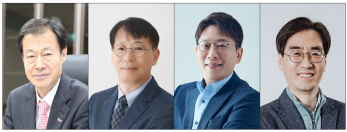
KAIST Alumni Association to Honor Alumni of the Ye..
Photo 1. Photo of the KAIST Alumni of the Year Award Recipients (From left) UST President Lee-whan Kim, CEO Han Chung of iThree Systems Co., Ltd., CEO Dong Myung Kim of LG Energy Solution Co., Ltd., and Professor Hyun Myung of the School of Electrical Engineering at KAIST KAIST (President Kwang Hyung Lee) announced on Monday, the 13th of January that the Alumni Association (President Yun-Tae Lee) has selected its Alumni of the Year. This year’s honorees are: ▴ President Lee-whan Kim of the Korea National University of Science and Technology (UST), ▴ CEO Han Chung of i3 Systems, ▴ CEO Dong Myung Kim of LG Energy Solution, and ▴ Professor Hyun Myung of the School of Electrical Engineering at KAIST. The honorees were selected based on their achievements over the past year, and the award ceremony will be held at the 2025 KAIST Alumni Association New Year’s Gathering to be held at the L Tower in Seoul at 5 PM on Friday the 17th. The KAIST Alumni of the Year Award is an award presented by the Alumni Association to alumni who have contributed to the development of the country and the society or have brought honor to their alma mater through outstanding academic achievements and community service. Since its establishment in 1992, 126 recipients have been awarded. Lee-whan Kim (Master's graduate of Mechanical Engineering, 82), the President of the Korea National University of Science and Technology (UST), established a leading foundation for national science and technology policy and strategy, and played a leading role in innovating national science and technology capabilities through the advancement of the national research and development system and the advancement of science and technology personnel training. In particular, he played a pivotal role in the establishment of UST and the Korea Science Academy (KSA), and greatly contributed to establishing a foundation for the training and utilization of science and technology personnel. Han Chung (Master's graduate of Electrical Engineering, 91, with Ph.D. degree in 96), the CEO of i3 Systems, is a first-generation researcher in the field of domestic infrared detectors. He developed military detectors for over 30 years and founded i3 Systems, a specialized infrared detector company, in 1998. Currently, he supplies more than 80% of the infrared detectors used by the Korean military, and has also achieved export results to over 20 countries. Dong Myung Kim (Master's graduate of Materials Science and Engineering, 94, with Ph.D. degree in 98) the CEO of LG Energy Solution Co., Ltd. has led innovation in the battery field with his ceaseless exploration and challenging spirit, and is known as an authority in the secondary battery industry. He played a leading role in establishing K-Battery as a global leader, strengthened the country's future industrial competitiveness, and greatly contributed to the development of science and technology. Hyun Myung (Bachelor's graduate of Electrical Engineering, 92, with Master's degree in 94, and Ph.D. degree in 98) a Professor of Electrical Engineering, KAIST, won first place in the world at the Quadruped Robot Challenge (QRC) hosted by the IEEE’s International Conference on Robotics and Automation (ICRA) 2023 with the 'DreamWaQ' system, an AI walking technology based on deep reinforcement learning that utilizes non-video sensory technologies. He contributed to enhancing the competitiveness of the domestic robot industry by developing his own fully autonomous walking technology that recognizes the environment around the robot and finds the optimal path. Yun-Tae Lee, the 27th president of the KAIST Alumni Association, said, “KAIST alumni have been the driving force behind the growth of industries in all walks of life by continuously conducting research and development in the field of advanced science and technology for a long time,” and added, “I am very proud of the KAIST alumni award recipients who are leading science and technology on the world stage beyond Korea, and I sincerely thank them for their efforts and achievements.”
-
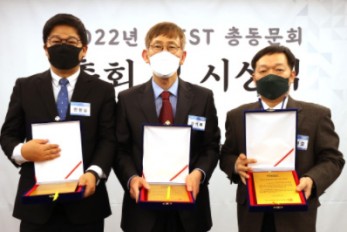
KAA Recognizes 4 Distinguished Alumni of the Year
< Distinguished Professor Sukbok Chang, Hyunshil Ahn at the AI Economy Institute at the Korea Economic Daily, PSTech CEO Hwan-ho Sung, Samsung Electrocnis President Hark Kyu Park (from left) > The KAIST Alumni Association (KAA) recognized four distinguished alumni of the year during a ceremony on February 25 in Seoul. The four Distinguished Alumni Awardees are Distinguished Professor Sukbok Chang from the KAIST Department of Chemistry, Hyunshil Ahn, head of the AI Economy Institute and an editorial writer at The Korea Economic Daily, CEO Hwan-ho Sung of PSTech, and President Hark Kyu Park of Samsung Electronics. Distinguished Professor Sukbok Chang who received his MS from the Department of Chemistry in 1985 has been a pioneer in the novel field of ‘carbon-hydrogen bond activation reactions’. He has significantly contributed to raising Korea’s international reputation in natural sciences and received the Kyungam Academic Award in 2013, the 14th Korea Science Award in 2015, the 1st Science and Technology Prize of Korea Toray in 2018, and the Best Scientist/Engineer Award Korea in 2019. Furthermore, he was named as a Highly Cited Researcher who ranked in the top 1% of citations by field and publication year in the Web of Science citation index for seven consecutive years from 2015 to 2021, demonstrating his leadership as a global scholar. Hyunshil Ahn, a graduate of the School of Business and Technology Management with an MS in 1985 and a PhD in 1987, was appointed as the first head of the AI Economy Institute when The Korea Economic Daily was the first Korean media outlet to establish an AI economy lab. He has contributed to creating new roles for the press and media in the 4th industrial revolution, and added to the popularization of AI technology through regulation reform and consulting on industrial policies. PSTech CEO Hwan-ho Sung is a graduate of the School of Electrical Engineering where he received an MS in 1988 and a PhD in EMBA in 2008. He has run the electronics company PSTech for over 20 years and successfully localized the production of power equipment, which previously depended on foreign technology. His development of the world’s first power equipment that can be applied to new industries including semiconductors and displays was recognized through this award. Samsung Electronics President Hark Kyu Park graduated from the School of Business and Technology Management with an MS in 1986. He not only enhanced Korea’s national competitiveness by expanding the semiconductor industry, but also established contract-based semiconductor departments at Korean universities including KAIST, Sungkyunkwan University, Yonsei University, and Postech, and semiconductor track courses at KAIST, Sogang University, Seoul National University, and Postech to nurture professional talents. He also led the national semiconductor coexistence system by leading private sector-government-academia collaborations to strengthen competence in semiconductors, and continues to make unconditional investments in strong small businesses. KAA President Chilhee Chung said, “Thanks to our alumni contributing at the highest levels of our society, the name of our alma mater shines brighter. As role models for our younger alumni, I hope greater honours will follow our awardees in the future.”
-
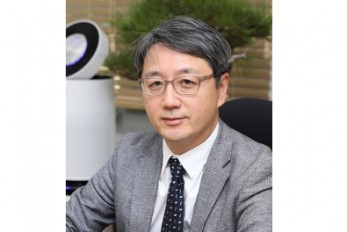
Professor Kang’s Team Receives the IEEE Jack Newba..
< Professor Kang (far left), Professor Sung-Ah Chung at KNU, and Professor Osvaldo Simeone of KCL > Professor Joonhyuk Kang of the School of Electrical Engineering received the IEEE Vehicular Technology Society’s 2021 Jack Neubauer Memorial Award for his team’s paper published in IEEE Transactions on Vehicular Technology. The Jack Neubauer Memorial Award recognizes the best paper published in the IEEE Transactions on Vehicular Technology journal in the last five years. The team of authors, Professor Kang, Professor Sung-Ah Chung at Kyungpook National University, and Professor Osvaldo Simeone of King's College London reported their research titled Mobile Edge Computing via a UAV-Mounted Cloudlet: Optimization of Bit Allocation and Path Planning in IEEE Transactions on Vehicular Technology, Vol. 67, No. 3, pp. 2049-2063, in March 2018. Their paper shows how the trajectory of aircraft is optimized and resources are allocated when unmanned aerial vehicles perform edge computing to help mobile device calculations. This paper has currently recorded nearly 400 citations (based on Google Scholar). "We are very happy to see the results of proposing edge computing using unmanned aerial vehicles by applying optimization theory, and conducting research on trajectory and resource utilization of unmanned aerial vehicles that minimize power consumption," said Professor Kang.
-
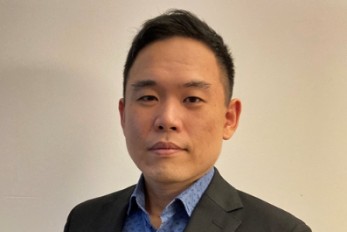
Alumni Professor Cho at NYU Endows Scholarship for..
< Alumni Professor Kyunghyun Cho at New York University endowed the “Lim Mi-Sook Scholarship” at KAIST for female computer scientists in honor of his mother. President Kwang Hyung Lee (far left) and his parents attended the donation ceremony last week at the campus. > Alumni Professor Kyunghyun Cho at New York University endowed the “Lim Mi-Sook Scholarship” at KAIST for female computer scientists in honor of his mother. Professor Cho, a graduate of the School of Computing in 2011 completed his master’s and PhD at Alto University in Finland in 2014. He has been teaching at NYU since 2015 and received the Samsung Ho-Am Prize for Engineering this year in recognition of his outstanding researches in the fields of machine learning and AI. “I hope this will encourage young female students to continue their studies in computer science and encourage others to join the discipline in the future, thereby contributing to building a more diverse community of computer scientists,” he said in his written message. His parents and President Kwang Hyung Lee attended the donation ceremony held at the Daejeon campus on June 24. Professor Cho has developed neural network machine learning translation algorithm that is widely being used in translation engines. His contributions to AI-powered translations and innovation in the industry led him to win one of the most prestigious prizes in Korea. He decided to donate his 300 million KRW prize money to fund two 100 million KRW scholarships named after each of his parents: the Lim Mi-Sook Scholarship is for female computer scientists and the Bae-Gyu Scholarly Award for Classics is in honor of his father, who is a Korean literature professor at Soongsil University in Korea. He will also fund a scholarship at Alto University. “I recall there were less than five female students out of 70 students in my cohort during my undergraduate studies at KAIST even in later 2000s. Back then, it just felt natural that boys majored computer science and girls in biology.” He said he wanted to acknowledge his mother, who had to give up her teaching career in the 1980s to take care of her children. “It made all of us think more about the burden of raising children that is placed often disproportionately on mothers and how it should be better distributed among parents, relatives, and society in order to ensure and maximize equity in education as well as career development and advances.” He added, “As a small step to help build a more diverse environment, I have decided to donate to this fund to provide a small supplement to the small group of female students majoring in computer science.
-
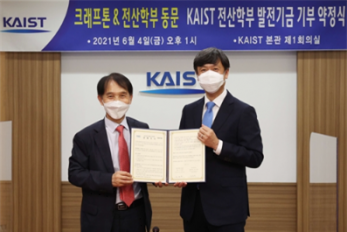
Krafton Matches Alumni Donations to Raise 11 Billi..
Alumni donations from the School of Computing, including Baemin and Devsisters, continue to grow < The Krafton matching grant ceremony was held on June 4 at KAIST campus. > Alumni from the KAIST School of Computing who are current and former developers at the leading game company Krafton, established by KAIST alumna Byung-Gyu Chang, made an agreement to help raise 11 billion KRW during a ceremony on June 4. The funds raised in the matching grant will be used to nurture software developers. Krafton Chairman Chang donated 10 billion won last January. His donation inspired other alumni working at Krafton as well as its former developers. Eleven KAIST alumni raised 5.5 billion KRW in two months and discussed the matching grant idea with Chairman Chang. The Krafton matching grant ceremony was attended by President Kwang Hyung Lee, Provost and Executive Vice President Seung Seob Lee, Vice President for Research Sang Yup Lee, Head of the School of Computing Sukyoung Ryu, Krafton Chairman Byung-gyu Chang, and KAIST alumnus from Krafton Seung-woo Shin. Other alumni donors including Krafton CEO Changhan Kim joined the ceremony online. Krafton CEO Changhan Kim said, “Just as our alma mater played an important role in growing our company, we hope that our donation could help support good developers. This will not only help our company, but advance our industry.” KAIST and Krafton also signed a business agreement to foster competitive developers. Krafton said it plans to continue giving back to society through the matching grant program. Head of the School of Computing Sukyoung Ryu thanked Chairman Chang and alumni who took part in the fund raising, saying, “To take the lead in rapidly changing computer technology, we desperately need more top students, faculty members, and facilities. We need more resources and infrastructure for interdisciplinary research.” The School of Computing has seen significant growth recently. Its number of undergraduate students has increased from 450 in 2016 to more than 900 in 2021. With this donation, the school will expand its current buildings to provide diverse educational and mentoring programs in more spacious facilities. Seung-woo Shin (Class of ’92), who joined Krafton’s matching grant, said, “I have always been thankful for the people I met and what I learned at KAIST. I was moved by the idea of giving back to the school.” Seong-jung Ryu (Class of ’97) said, “This donation reminded me of the good times I had back then. I thought it was crucial that the department’s facilities be extended, so I naturally wanted to take part.” Alumni donations, especially from the School of Computing, have also continued to grow more recently. Woowa Brothers Corp. CEO Beom-Jun Kim, the developer of the meal delivery app ‘Baemin’ donated 100 million KRW in April. Baemin became the most used app in the country during the COVID-19 pandemic. He explained, “I have been thinking about ways to give something to the next generation, rather than ‘paying back’ those who helped me in the past.” Encouraged by Baemin’s donation, alumni couple Ha-Yeon Seo and Dong-Hun Hahn from the School of Computing and eleven alumni engineers working at Devsisters Corp. also followed suit.
-
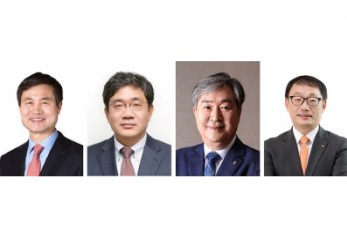
Distinguished Alumni Awardees 2020
The KAIST Alumni Association (KAA) announced the four recipients of the Distinguished Alumni Awards for the year 2020. The Distinguished Alumni Awards recognize graduates who have achieved outstanding accomplishments in their professional and personal lives, and who have been an inspiration to fellow alumni and students in Korea and around the globe. The four distinguished alumni of the year 2020 are listed below. President Dong-Won Kim (Department of Industrial and Systems Engineering, M.S., Class of ’82) of Jeonbuk National University is making significant contributions to the advancement of local industrial technology and the cultivation of professional personnel through outstanding research outcomes. As an educational administrator, his leadership is helping to realize long-desired projects at the university, through which he is strengthening the competitiveness of the university and the local community. Tae-Kyung Yoo (School of Electrical Engineering, M.S. and Ph.D., Class of ’83 and ’85 respectively), CEO and Chairman of Lumens, is a first-generation entrepreneur in the light emitting diode (LED) industry in Korea. He runs Lumens, a globally renowned company specializing in and leading the technological innovation of LEDs. He thereby contributes to strengthening national competitiveness and the advancement of science and technology. President Nak Kyu Lee (Department of Mechanical Engineering, M.S. and Ph.D., Class of ’85 and ’87 respectively) of the Korea Institute of Industrial Technology (KITECH) has shown excellent results in his research in which he developed core production technologies to lead the nation’s industries. He also focused on supporting on-site technologies involved in field work to apply what he developed into real production processes, and contributed greatly to improving the competitiveness of nationwide manufacturing. Hyeon-Mo Ku (School of Business and Technology Management, M.S. and Ph.D., Class of ’85 and ’93 respectively), CEO of KT Corporation, helped the nation’s leading communications company roll out the first 5G network in the world. He also strengthened national competitiveness in AI technology through ‘AI One Team,’ an industry-academic corporation project, and took the lead in developing the home-grown cloud industry. His involvement in the innovation of Korea’s ICT technology was highly recognized. Since the establishment of the award in 1992, a total of 107 alumni at home and abroad have brought distinction to the university and been honored as recipients. These recipients are playing major roles in society, and some of the notable former awardees include: KAIST President Sung-Chul Shin (2010), Samsung Electronics Vice Chairman Ki-Nam Kim (2012), Nexon Chairman Jung-Ju Kim (2007), and Krafton Chairman Byeong-Gyu Chang (2006). The President of the KAA and Advisor of Samsung Electronics, Chilhee Chung, said, “The Distinguished Alumni Awards are an honor given to alumni who have contributed to the development of the nation and society, and raised the name of their alma mater.” He added, “We can see the proud position of KAIST in the global arena just by looking at the accomplishments of our awardees.” (END)
-
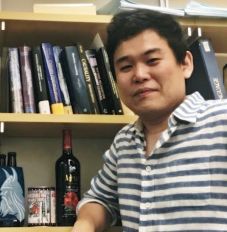
KAIST Alumnus NYU Professor Supports Female AI Res..
A KAIST alumnus and an associate professor at New York University (NYU), Dr. Kyunghyun Cho donated 3,000 USD to the KAIST Graduate School of AI to support female AI researchers. Professor Cho spoke as a guest lecturer at the 2019 Samsung AI Forum on November 4 and received 3,000 USD as an honorarium. He donated this honorarium to the KAIST Graduate School of AI with a special request to support the school’s female PhD students attending the 2020 International Conference on Learning Representations (ICLR), where he serves as a program co-chair. Professor Cho received his BS degree from KAIST’s School of Computing in 2009 and is now serving as an associate professor at NYU’s Computer Science Department and Center for Data Science. His research mainly covers machine learning and natural language processing. Professor Cho said that he decided to make this donation because “In Korea and even in the US, women in science, technology, engineering, and mathematics (STEM) lack opportunities and environments that allow them to excel.” Professor Song Chong, the Head of the KAIST Graduate School of AI, responded, “We are so grateful for Professor Kyunghyun Cho’s contribution and we will also use funds from the school in addition to the donation to support our female PhD students who will attend the ICLR.”
-
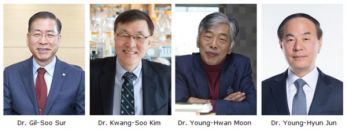
Distinguished Alumni Awardees 2018
The KAIST Alumni Association (KAA) announced four recipients of the Distinguished Alumni Awards 2018. The Distinguished Alumni Awards recognize graduates who have achieved outstanding accomplishments in their professional and personal lives, and who have been an inspiration to fellow alumni and students in Korea and around the globe. Since the establishment of the award in 1992, a total of 99 alumni at home and abroad have been honored as recipients. The awards ceremony will take place during the New Year Alumni Reception on January 19 in Seoul. Yeungnam University President Gil-Soo Sur (’75 MS, ’78 PhD in Chemistry) has demonstrated leadership in higher education and gained trust in academia for playing a leading role in educational innovation as well as serving as an educator who has fostered outstanding research talents for decades. Professor Kwang-Soo Kim (’77 MS, ’79 PhD in Life Science) is the director of the Molecular Neurobiology Laboratory at McLean Hospital at Harvard Medical School. He has more than 20 years of experience investigating molecular and developmental neurobiology of the midbrain dopamine neuronal system. He has contributed to developing cell replacement therapy for Parkinson’s disease and has pioneered a generation of safe human-induced pluripotent stem cells through the direct delivery of reprogrammed proteins. Young-Hwan Moon (’82 MS, ’87 PhD in Chemistry and Biomolecular Engineering) is the CEO of Coretech, which specializes in producing specialty gases and environmental catalysts required for chemical processes. He was recognized for enhancing national competence by securing competitive technology for manufacturing products. Young-Hyun Jun (’84 MS, ’86 PhD in Electrical Engineering), the CEO of Samsung SDI, is a globally renowned expert in memory semiconductors. By bringing about innovative technology to enhance productivity and processes, he led Samsung Electronics to become the number one company at the global level in the field of semiconductors.
-
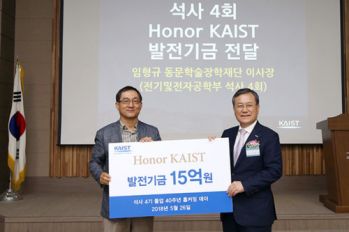
KAIST Class of ’78 Celebrates 40-Year Reunion
(from left: Chairman Hyung Kyu Lim from the KAIST Alumni Scholarship Foundation and KAIST President Sung-Chul Shin) The Class of 1978 reunited on May 26 at the College of Business on the KAIST Seoul Campus, which was the main campus when they were students 40 years ago. Now leaders of Korea in the sectors of industry, academia, and research, the Class of ’78 held a homecoming event in celebration of the 40th anniversary of their graduation. Approximately 120 guests attended the event, including the head of the KAIST Alumni Association Ki-Chul Cha, Emeritus Professor Jae-Kyoon Kim, and Emeritus Professor Choong-Ki Kim from the School of Electrical Engineering. The Class of ’78 includes Man Gi Paik from the Ministry of Trade, Industry and Energy, Chairman Hyung Kyu Lim from the KAIST Alumni Scholarship Foundation, President Sang Hyuk Son from Daegu Gyeongbuk Institute of Science & Technology, and Provost and Executive Vice President O Ok Park from KAIST. At the event, the Class of ‘78 donated a scholarship worth 1.5 billion KRW. Chairman Lim said, “We will put every effort into helping KAIST students who will be future leaders. We hope this fund will go toward students who will create new value and contribute to society.” President Shin added, “The effort and affection of the alumni will be a strong foundation for KAIST taking the next big step. In response to the support and affection of 61,125 KAIST alumni, KAIST will make every effort to become a world-leading university.”

